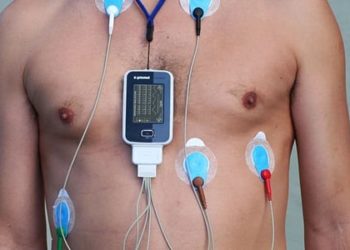Low-cost biochip isolates cells for clinical diagnosis [PreClinical]
1. Researchers manufactured a microfluidic biochip, using an inkjet printing system to apply conductive nanoparticles to a polymer substrate.
2. The biochip used an electric field to separate and capture cell populations, allowing for downstream characterization and further analysis.
Evidence Rating Level: 2 (Good)
Study Rundown: Some infectious diseases and cancers can be detected early through the identification of rare cell populations. The sorting and identification of these cells currently require bulky and expensive equipment, preventing their effective use in areas unable to obtain these technologies. The goal of this study was to develop a low-cost, reusable, and effective cell separation platform that could be used for diagnostics in resource-limited areas.
The biochip was designed to have three components: a reusable polyethylene terephthalate substrate with inkjet-printed conductive nanoparticles, a disposable microfluidic platform made of polydimethylsiloxane, and an insulating barrier. The biochip induced dipole moments, resulting in a dielectrophoresis (DEP) force that moved varying cell types based on differences in size and dielectric properties. This allowed for the effective separation and storage of different cell populations. A mixture of breast adenocarcinoma cells, yeast cells, and polystyrene microspheres was used to test the biochip. The three particle types were collected with high separation efficiency. The cells were viable after being on the biochip, indicating they could be used for downstream analyses.
Future work must evaluate the biochip using more clinically relevant cell mixtures. However, the biochip demonstrates potential for diagnostics and research studies on rare cell populations. Without the need for clean rooms or time consuming processing, manufacturing the biochip only requires vector-drawing software and inkjet printing technology. With a production time of around 20 minutes and a materials cost of $0.01 per chip, this biochip could be feasibly produced in developing and low-income areas. Not only can clinical samples be reused after processing on the biochip, but the chip itself is also a reusable platform. This technology could enable faster diagnostic capabilities and early detection of rapidly progressing conditions.
Click here to read the study in PNAS
Relevant Reading: A microfluidic biochip for complete blood cell counts at the point-of-care
In-Depth [in vitro study]: To collect single cells, the biochip used contactless dielectrophorectic-traps and an array of facing electrodes. When particles were introduced to the chip, each cell experienced negative DEP forces that trapped it in a chamber within the electrical field. Once a cell was trapped in a chamber, no other cells could enter.
To optimize the parameters of the biochip, polystyrene microspheres were put in the chip and subjected to various voltages and signal frequencies to determine their effects on the resulting velocity and DEP force. Flow rates were adjusted to optimize the capture efficiency, with higher flow rates resulting in a 5–10% drop in the efficiency of capturing the microspheres. These parameters were then validated using a breast adenocarcinoma cell line (MDA-MD-231) and yeast cells.
Cells were isolated from the chip and assessed for viability. A 1.5-fold increase in transformation efficiency was noted in the yeast cells, confirming the safety of this technology. A mixture of MDA-MD-231 cells, yeast cells, and streptavidin-coated polystyrene microspheres was put into the biochip. Because each of these particles have different polarization properties, they could be separated by the biochip. Separation efficiency was found to be 79, 88, and 86% for the breast cancer cells, yeast cells, and microspheres, respectively.
Image: PD
©2017 2 Minute Medicine, Inc. All rights reserved. No works may be reproduced without expressed written consent from 2 Minute Medicine, Inc. Inquire about licensing here. No article should be construed as medical advice and is not intended as such by the authors or by 2 Minute Medicine, Inc.







